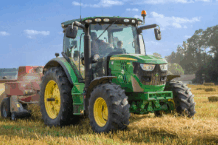By: Scott Eckert, County Extension Agent, Horticulture
Our weather and climate can sure surprise us! Reducing home water use has become a major concern for many people today. Since outdoor water use often comprises more than half of the water consumed by the average household, it is an area where many significant
improvements can be made. Careful planning, proper soil preparation can help make the most of every available drop of water.
When looking for ways to save water in the garden, most attention is usually focused on irrigation systems, mulches, or other visible improvements. One less visible, but equally important way to reduce water consumption is the addition of organic matter to the soil.
Organic matter is derived from living or once living plants or animals. Microorganisms breakdown these residues into a fine black water-absorbing substance called humus. Adding humus to your garden is almost like adding a sponge to your soil.
All types of soil found in Kansas can benefit from the addition of organic matter. In sandy soil, organic matter binds the soil particles, increasing its water holding capacity and making more water available to plant roots. In clay soil, organic matter loosens the soil by improving its structure, which also increases water availability. Sunshine, high temperatures and dryness, all work to oxidize or “burn up” organic matter, so it needs to be added each year. In the garden, this can be accomplished by the addition of compost, manure, or other similar types of material when preparing the soil in the fall or spring. In
more permanent plantings, such as fruit, asparagus or rhubarb, the soil should be amended with organic matter before the plants are set out. Mulches can be used after-wards to supply additional organic matter.
The amount of organic material to add will depend on the type used. A rough estimate is a layer 1 to 4 inches deep, applied to the soil and turned under. Concentrated material such as manure will require the smaller amount, while a looser material such as peat moss will require the larger amount.
Commonly Available Soil Amendments
Animal manures- Can contain weed seeds. Chicken manure is highly concentrated, so use less. As the straw content of the manure increases, more material can be applied.
Wood By-Products: Sawdust, wood chips, fresh sawdust. Add extra nitrogen when using fresh sawdust. Avoid treated wood or wood from trees containing thorns.
Compost- An excellent soil builder.
Leaves/ Leaf mold- Best to compost or shred leaves first. Good soil amendment. May
increase soil acidity somewhat.
Lawn clippings- Avoid clippings from Bermudagrass lawns or lawns treated with
herbicides.
Peat moss- Expensive, but long lasting.
Straw/Hay- Weed seeds often present. Additional nitrogen may be needed.
Green manure/cover crops- Can tie up growing space unless grown in late fall or over winter. Till under at least two weeks before planting the garden.
If you only do one thing to your soil, add organic matter!



